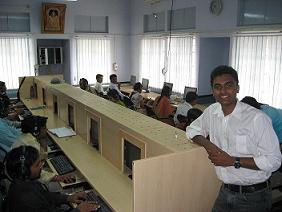Meet Manoj Vasudevan: Founder of SourcePilani, a rural BPO
At first glance, Manoj Vasudevan looks like any other corporate leader. With his formal attire and professional demeanor, he can fool anyone by his appearance. But if you remove the

At first glance, Manoj Vasudevan looks like any other corporate leader. With his formal attire and professional demeanor, he can fool anyone by his appearance. But if you remove the outer shells, you would discover a kurta clad social enthusiast within him. Manoj started out on a conventional MNC path, but soon left it for his true calling – taking development to the heart of India.
 A graduate of the Birla Institute of Technology and Science (BITS) Pilani, Manoj holds a Bachelor’s in Electrical and Electronics Engineering. After graduating in 2006, he worked for IBM in Bangalore and in Texas for about a year and a half. In September 2007, he realised he wanted different things. He wanted to start a rural BPO! “I told my parents that I was quitting my job to start a BPO in Pilani. I had a tough time convincing them. My mom wondered if I had gone mad. I always felt that the beauty of youth is in the fact that you have nothing to lose. You can try things. I overcame the initial resistance from family and finally established SourcePilani, one of India’s first rural BPOs. We provide services in medical transcription and social media monitoring,” says Manoj with a smile.
A graduate of the Birla Institute of Technology and Science (BITS) Pilani, Manoj holds a Bachelor’s in Electrical and Electronics Engineering. After graduating in 2006, he worked for IBM in Bangalore and in Texas for about a year and a half. In September 2007, he realised he wanted different things. He wanted to start a rural BPO! “I told my parents that I was quitting my job to start a BPO in Pilani. I had a tough time convincing them. My mom wondered if I had gone mad. I always felt that the beauty of youth is in the fact that you have nothing to lose. You can try things. I overcame the initial resistance from family and finally established SourcePilani, one of India’s first rural BPOs. We provide services in medical transcription and social media monitoring,” says Manoj with a smile.
Why a rural BPO? How did Manoj come up with such a novel concept? At that time, one of his friends and a BITS Pilani alumnus was working with Satyam Computers. He was the one who introduced Manoj to GramIT, an initiative of the Byrraju Foundation. “I decided to take up this model in a big way. In 2007, I noticed two challenges in livelihood generation. One was that there was limited potential in agriculture. There are still eight million unemployed rural educated youth in India. They go to the cities, can’t find jobs and they come back. It becomes a vicious cycle. The second trend was that the BPO sector was bleeding. Annual wage increases were too quick, attrition was too high. Solving these two problems, I decided to take the BPO to the BOP, that is, the bottom of the pyramid. For me, that is inclusive economics.”

While the concept of rural BPOs offers tremendous opportunity in terms of a 40-50% cost advantage, there are also plenty of operational challenges associated with it. The task of getting rural Indians to cater to foreign clients is easier said than done. Manoj solves this problem to a large extent by collaborating with BITS to start an English language programme called SHARE, short for ‘Speak, Hear and Read English’. This course makes rural people proficient in English in just 10 weeks. Apart from these technicalities, there were plenty of social challenges. Manoj explains, “People in Pilani were apprehensive that our BPO would modify the cultural fabric of the rural society. It would be wrong to say that life in these areas would not change at all with something like a BPO coming up. At the same time, you can’t run it from a hut. How did we manage people’s fears? We spoke to them and explained the benefits of the job opportunities SourcePilani would create for them. We had many Townhall sessions with the villagers. Slowly, more women also started coming to attend these.”
Hiring women to work in a BPO in Pilani, where in some rural pockets even the purdah system is still prevalent sounds next to impossible. “We have learnt a lot about working with women. I remember when we hired a batch of young college pass out girls, after six months they all left the jobs. I found out that it was because in the village, girls are married off to men from another village. It was an accepted rule. How did we change that? We didn’t. We decided not to hire girls of a marriageable age!” While at one level, this may sound like he is excluding a large chunk of the society from getting employed, on the other it is also a business decision. For someone like Manoj, the corporate attire fits well with the khadi kurta. While he is motivated to make a difference, he never loses sight of practicality. At the end of the day, this is what makes his social enterprise sustainable.
Also: Read our earlier article on SourcePilani and how it operates.
This story made me
-
97
-
121
-
89
-
167













